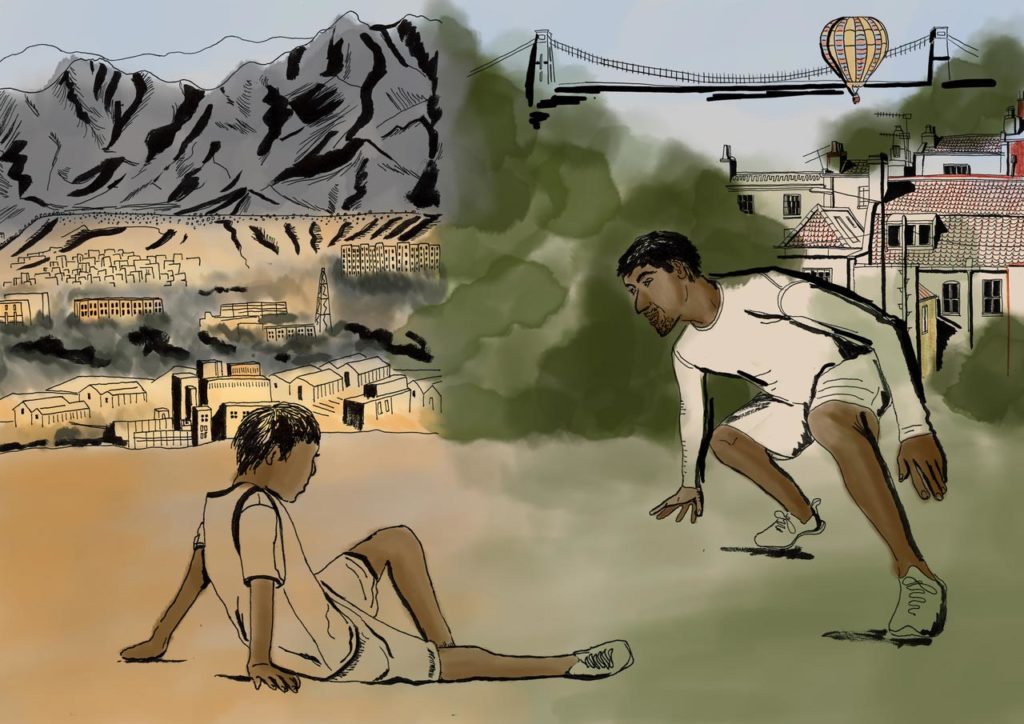All Alone, Far Away From Home

The illustration by Laurel Molly. Find her on Instagram @laurel_molly.
For young people caught up in the UK’s asylum system, the good intentions of everyone concerned by no means guarantee a fair outcome.
Ali, a polite, dark-eyed boy who loves cricket and boxing, arrived in the UK on his own when he was thirteen and was placed in care. Seven years later his legal status was still unresolved, he’d lost housing and income support and was effectively homeless, couch-surfing when he could with friends. He had trouble sleeping, was always exhausted and his resulting poor memory made it difficult to remember appointments and information from his solicitor. As the people he went to school with headed off for jobs and university, he was stuck in legal limbo, depressed and anxious, unable to move forward with his life. His story is by no means uncommon.
Separated children and young people seeking sanctuary in the UK are put into the same social care system as British children. Although there are many overlapping needs, there are also critical differences. Beyond the significant cultural and language differences, young people seeking asylum must engage in the legal system in order to receive the legal right to remain in the country—a right upon which every other kind of security, wellbeing and opportunity is ultimately dependent. In many places, social workers and other local authority workers are overworked, underfunded and do not have the expertise necessary to navigate the complex asylum system. Because of this reality, children and young people sometimes do not receive appropriate legal advice or representation and therefore their cases are inappropriately refused.
Thankfully, Ali was eventually referred to Bristol Refugee Rights (BRR) and this was when things started to turn around for him.
For the past two years a Bristol Refugee Rights project called The Young People’s Immigration Project has worked one on one with more than sixty-nine unaccompanied young people seeking asylum. Many of them have fled the conflict in Afghanistan, have lost family members who were killed and have undergone a long and often violent and chaotic journey overland from Afghanistan to the UK. Some were forced into modern day slavery at the hands of smugglers and managed to escape harrowing situations. All of them arrived in the UK alone as children.
Our staff at BRR meet each young person, get to know them, hear their story, piece together what went wrong for them, and organise mental health support for them. Often this is the first time they have been given any tools to understand the trauma symptoms they are experiencing. We help them find a solicitor or to understand the work their current solicitor is doing. Our experienced staff often discover new evidence that nobody else has thought of and we do the leg work to chase down this evidence. We write letters to submit to the Home Office about what we come to know about the young person, their past, their present, their needs and vulnerabilities. Sometimes our staff go to asylum court as witnesses. In some cases, our testimony has played a key role in the judge’s positive decision.
Our staff did all this work with Ali, collecting evidence, writing letters and perhaps most importantly, convincing the local authority who had been supporting him since he arrived in the UK to provide evidence. They were hesitant at first to be involved in the legal side of things, but BRR worked with them to see how relevant their assessment of Ali’s needs and vulnerability was to his case. In the end, Ali’s Personal Advisor not only wrote a letter, but also attended his hearing as a witness. Ali’s appeal was eventually successful— he received refugee status. At first he struggled to believe he’d won. But once it had sunk in, he was so relieved. His goal of working towards becoming a professional sports coach was now possible. But to achieve that goal Ali, who is still homeless, will have to start from the beginning without any job experience and try to find a job. All without the safety net of family or dedicated social services staff. His story, while a success, highlights how many obstacles separated young people face in building a secure life here in the UK.
The Young People’s Immigration Project is moving onto a second phase. Bristol Refugee Rights is taking all this experience of working with underage people seeking asylum and we are focusing our efforts on improving the system. We are working with Bristol social services to address the systemic issues that cause separated children and young people to fall through the cracks in the first place. The goal is that no young person has to go through what Ali and so many others had to go through. The goal is that good intentions are reliably turned into safety and justice for vulnerable young people.
Tannith Perry
Read more about Young People’s Immigration Project.
Read our member Mosi’s experience in the Penally Camp Army Barracks.